We have much more to do and your continued support is needed now more than ever.
Engaging Communities on Climate Change
Dear Tampa Bay Case Study
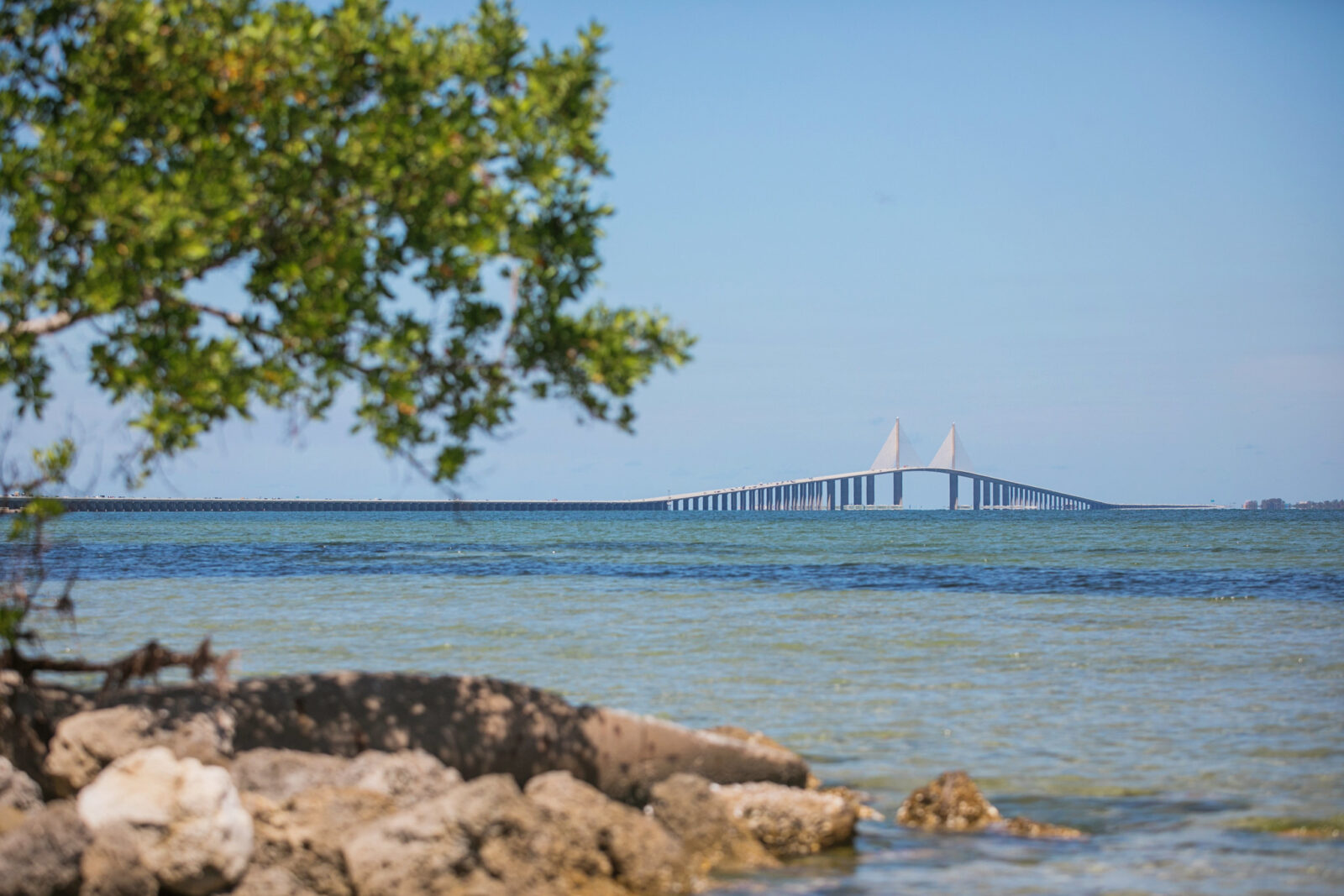
For many of us, thinking about climate change, sea level rise, and what lies ahead can be overwhelming. Oftentimes, people don’t take action because they’re not sure where to start or how to make a difference.
- How can a community become more resilient to climate change?
- How can an individual support their community to take actions?
- And how do we empower individuals and communities, particularly the most susceptible ones, to tackle climate change challenges and advance solutions?
The National Wildlife Federation’s Gulf Program explored these questions and more through our Dear Tampa Bay project – using storytelling and experiential learning to gauge impact on awareness and engagement. The better we understand how to effectively communicate and engage people around climate risk, the greater success we’ll have at addressing climate risks.
With support from the National Academies of Sciences, Engineering and Medicine, our project engaged with the communities around Tampa Bay, Florida. Local leaders across the Tampa Bay region are working to increase climate resilience within their communities, but success hinges on broad public support, which requires awareness about the challenges faced and solutions at hand. Our project set out to understand how personal storytelling through film and expert-led field trips would help not only educate people about climate risks in the region, but we could empower them to engage on solutions – and make progress against the immense challenges facing these areas.
The findings are relevant to communities across the nation dealing with ongoing climate impacts. The concerns addressed in the Dear Tampa Bay film and education work are not unique to Tampa Bay – they apply to many vulnerable coastal communities across the United States. These special landscapes, which are home to millions of people and also sustain multi-billion dollar economies and critical wildlife habitats, are facing similar issues when it comes to climate change vulnerability.
Aha! This is how to empower action on climate change
NWF has long used storytelling and field tours to educate and engage stakeholders across the Gulf in building resilience. Our project, Dear Tampa Bay, was designed to test the impact of those outreach and communication approaches. What we found was very promising – and could be applied more broadly to other vulnerable coastal communities across the U.S.
We partnered with Dr. Rebecca Johns at University of South Florida (USF) to evaluate how the approaches affected how much people knew about climate change, how connected they felt emotionally, and how confident and willing they were to make a difference in their communities. We conducted surveys before and after film screenings and organized focus groups following the boat tours, which revealed major shifts in attitudes and knowledge.
“This project advances our understanding of how innovative communication approaches can increase local leaders’ understanding of climate related risks and opportunities for resilience, connect people to their local environment in a powerful way, and motivate active citizenship.”
Dr. Rebecca Johns, USF
Highlighted findings from surveys conducted at over 50 film screenings across Tampa Bay include:
- a 240% increase in viewers’ willingness to work with a group to advocate for nature-based infrastructure to absorb storm surge and sea-level rise;
- a 214% increase in willingness to work with a group to educate neighbors about the need for climate change policy solutions;
- a 149% increase in willingness to attend meetings to learn about city and county resilience initiatives and how to become involved;
- A 76% increase in willingness to volunteer with an organization to build living shorelines such as oyster beds;
- a 35% increase in willingness to attend hurricane prep meetings.
Highlighted themes from boat tour surveys and focus groups include:
- immersive learning fosters an understanding of climate challenges, while also fostering a generally positive, hopeful outlook if collective action is taken;
- recognition of the value of civic engagement, such as collective, community action and education and outreach to neighbors and community leaders;
- an emphasis of collective, community-scale action, rather than individual;
- and recognition of systemic inequity as a major climate challenge.
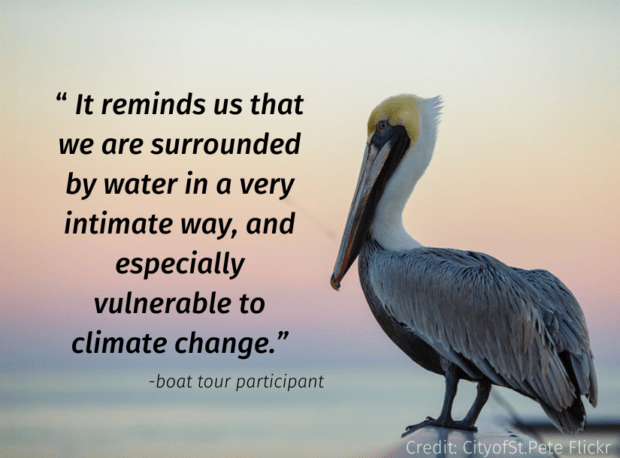
Empowering Communities: Our Methods
Dear Tampa Bay Film
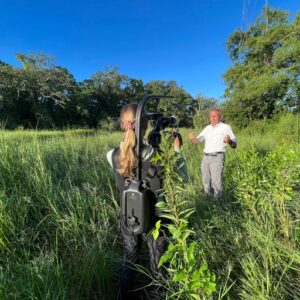
Our film, Dear Tampa Bay, tells a story to Tampa Bay, urging communities to acknowledge the potential threats of climate change and explore the path towards climate resilience. Filmed in coastal Texas, Louisiana, Mississippi and Florida, this film presents personal narratives from community leaders along the Gulf Coast who’ve all faced major climate challenges and engaged in solution-oriented efforts.
Dear Tampa Bay, filmed by Wildpath, delves into the challenges Tampa Bay might face and examines the solutions used across the Gulf. “We worked to relay climate challenges and solutions from a very personal, relatable, and accessible lens that showcases the importance and urgency of action for all of us. You need not have a degree in engineering or climate science to be a climate leader in your community. And the results of the project underscored that this type of communication prompts a strong, empowered response,” said project leader and NWF Gulf Director, Amanda Moore, who is also a Tampa Bay resident. The film was screened across the region at over 50 screenings for over a thousand community members across Tampa Bay and was showcased in multiple film festivals across the nation.
Watch the full film and learn more about the cast here.
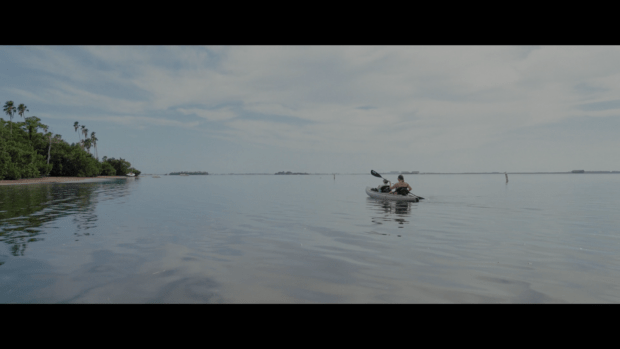
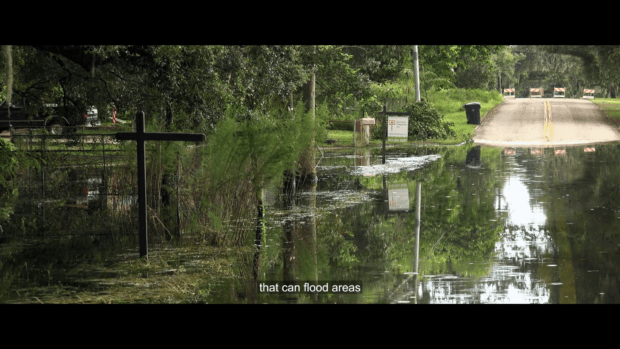
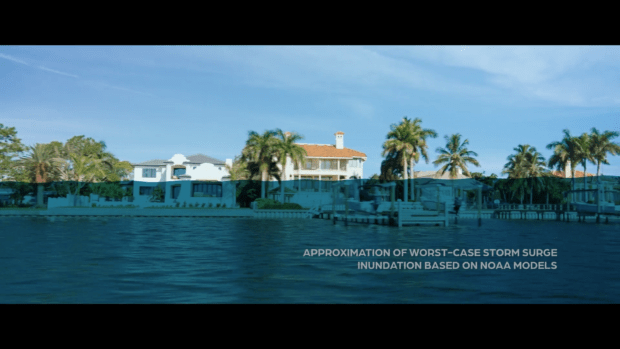
Coastal Resilience Boat Tours
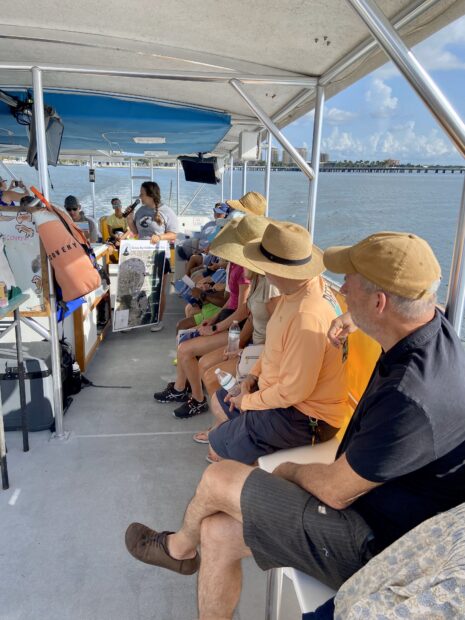
Over the summer, one hundred community members and local leaders set sail aboard Tampa Bay Watch’s EcoVessel to explore the coastline of St. Petersburg and to learn about climate impacts and solutions firsthand. Led by local coastal resilience specialists, tour participants were brought out to witness the diverse and valuable ecosystems of Tampa Bay and to observe the impacts of sea level rise and development.
The outing provided guests a dolphin’s eye view of local resilience solutions such as living shorelines, vital coastal ecosystems, hurricane-resistant structures, and hardened shorelines. Participants asked questions along the way and sometimes took the mic themselves to educate their neighbors!
Why Study Tampa Bay?
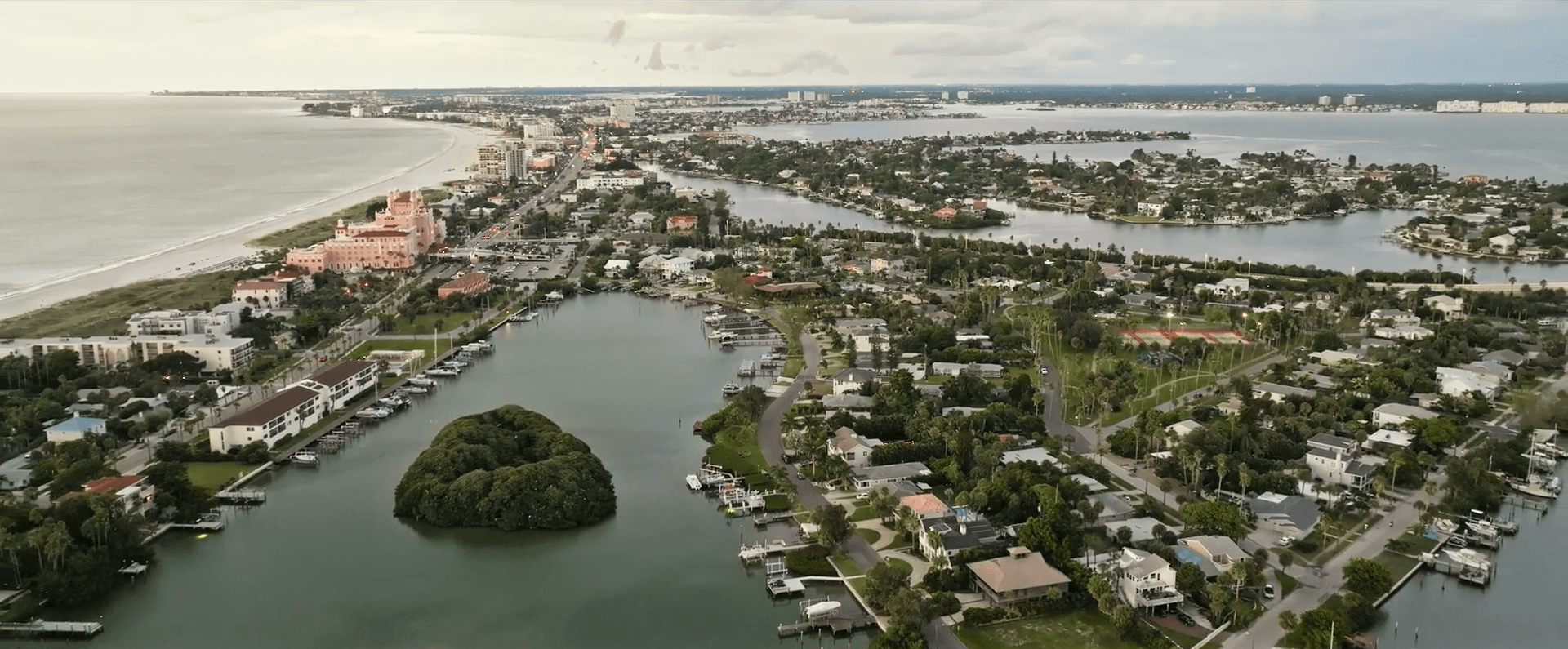
Ahhh, beautiful Tampa Bay, an eclectic locale with 700 miles of coastline and some of the top-ranked beaches in the country! It’s home to nearly 4 million diverse residents – more than the whole state of Mississippi – and with millions of visitors each year, it’s a hot destination to visit or call home.
But amidst this serenity, a concern looms — a stark reality that Tampa Bay is extremely vulnerable to the changing climate and inevitable sea level rise. In fact, the World Bank named Tampa Bay one of the ten most at risk metropolitan areas in the world because of its extensive development in flood-prone areas and low readiness to major tropical storm impacts.
In the case of Tampa Bay, thankfully, this area has been spared from a major hurricane direct hit for more than a century. Whether it’s due to good fortune, geographic factors, or the spiritual safeguards of the Indigenous community (as local legend has it), the locals aren’t as anxious as those in regions that regularly face the brunt of major hurricanes. However, consequences of a major storm would be disastrous. According to one study, a Katrina-sized storm would have a staggering $175 billion impact on the region. As ocean temperatures rise, the intensity of tropical storms are predicted to increase, leading to greater economic damage.
Even in the absence of major hurricanes, extreme heat, flooding, loss of drinking water, and algal blooms are all becoming prevalent concerns. Sea levels in Tampa Bay have gone up by more than 7 inches since the 1940s and are expected to rise by another 2 to 8 feet by the end of this century, depending on the climate change scenario. Sea level rise is also amplifying the impact of storms and other extreme weather events, exacerbating water quality issues in the bay, inundating drinking water supplies and threatening the infrastructure of sewage and stormwater systems.
Learn more about other ways climate change will impact Tampa Bay here.

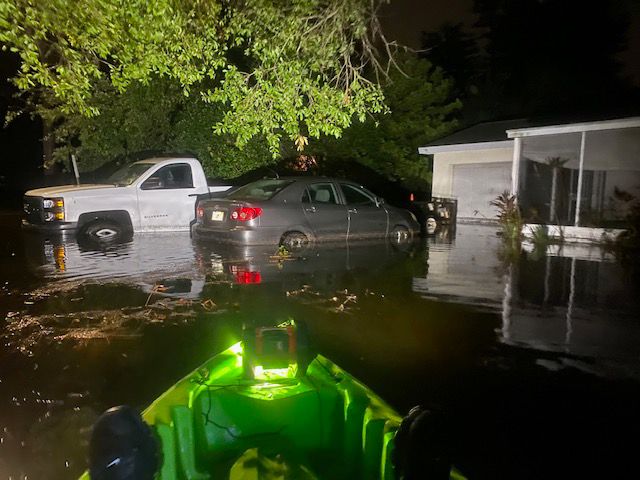
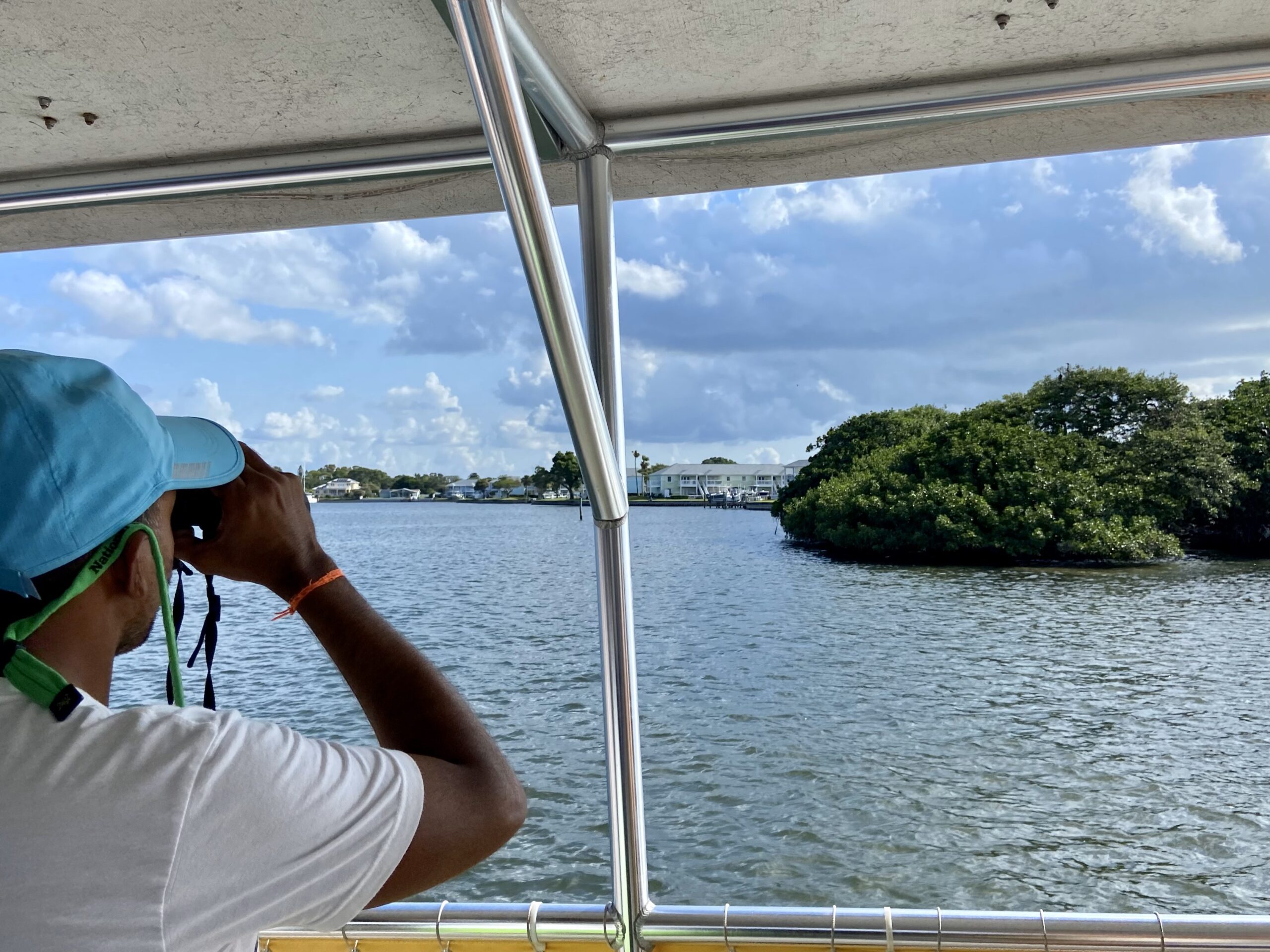
Across the nation, we are facing major challenges from climate change impacts. Understanding how to increase awareness and engage communities to be a part of the solution is an essential step in building our collective resilience. Help spread the message to your community. Start now by checking out our project resources to learn more about storytelling and experiential learning as a way to be a part of the solution.





















